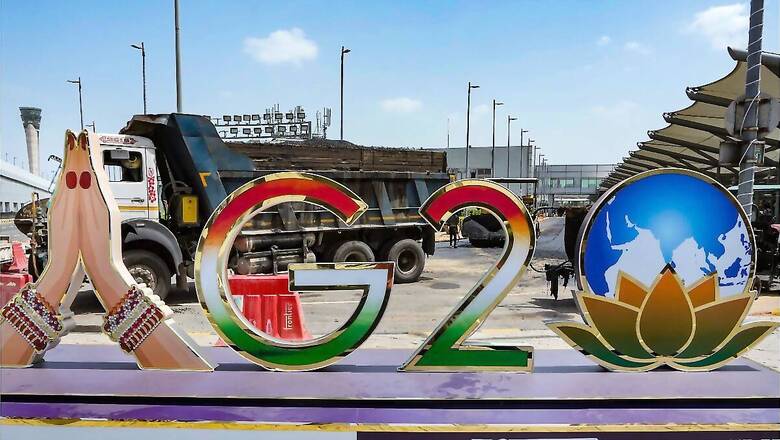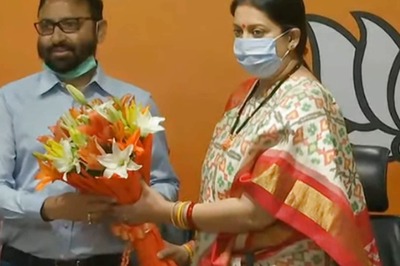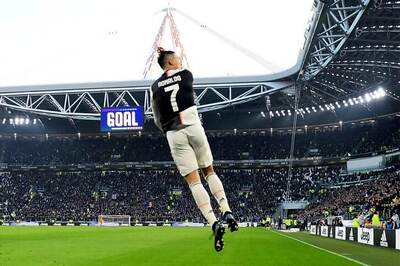
views
As the Group of Twenty (G20) summit approaches, the international stage is set for a showdown between the established powers of the G7 and the emerging strength of the BRICS nations. Central to the tension is what Russia refers to as the “Ukrainisation of the international agenda”.
Russian foreign ministry spokeswoman Maria Zakharova on Wednesday said, “Efforts by the United States and its allies to spread anti-Russia and anti-China information, primarily in the context of Ukraine, have been a special source of tension.”
She criticised Western efforts to divert attention from the actual challenges posed by the Ukraine crisis, highlighting a strategy to elevate this topic everywhere, even where it’s not directly relevant. “We refer to this phenomenon as the Ukrainisation of the international agenda, meaning a refusal to recognise the actual challenges related to the Ukraine crisis, its causes, and ways to settle it, while seeking to place this topic on top of the agenda everywhere even when it has no place in the discussion.”
As the Russia-Ukraine conflict continues even after one and a half years with no end in sight, most of the global platforms have been dominated by the war, its fallout on the world economy, and Europe shoring up support to condemn Russia for its military action in Ukraine.
Russian spokeswoman Zakharova expressed concerns over the West’s attempts to undermine consensus within the G20 and impose binding commitments from G7 agreements. She referred to these manoeuvres as “dirty tricks” that could hinder the G20’s potential for creative collaboration.
“We will work with a wide range of friendly partner countries within the G20 and rely on the BRICS countries to counter any detrimental processes in this regard,” she said.
This ambition finds its roots in the recently concluded Johannesburg BRICS summit, where the group added six new members. Bolstered by this expansion and driven by a shared belief that BRICS will become the voice of the Global South, Russia and China seem poised to challenge the traditional dominance of the G7.
India, in this complex equation, finds itself in a delicate position. Prime Minister Narendra Modi has been a regular attendee of G7 summits as an invitee, showcasing India’s aspiration for deeper global engagement. Simultaneously, as a founding member of BRICS, India has played a pivotal role in nurturing this emerging coalition. However, the current challenge lies in India’s role with the presidency of the G20 this year.
India, as the president of the G20 summit in 2023, has been careful in not making the event all about the Russia-Ukraine conflict and stressing on the important issues in the world that need the attention of the group’s members.
Addressing Network 18’s ‘Rising India Summit’ in March, external affairs minister S Jaishankar said the G20 was not the primary forum to debate international peace and security and India would want it to return to matters concerning roughly 200 countries of the world. “I think our contribution was to get the G20 back to the G20’s real business. The G20 is not the UN Security Council. It is not the primary forum to debate international peace and security,” the minister said.
Despite efforts by the European nations to invite Ukraine during the G20 summit, India remained unmoved and Ukrainian President Volodymyr Zelenskyy will not get a window to engage or interact with world leaders under the group’s framework.
Ukraine has also expressed its eagerness to attend the September G20 meet in Delhi. Ukraine’s first deputy foreign minister Emine Dzhaparova during her visit to New Delhi in April said, “My message during the visit is, let us consider participation of Ukrainian officials at the G20 summit to be held in India. During the September G20 summit, my President will also be happy to speak up on behalf of the Ukrainian people.”
There has been palpable tension on Ukraine not getting a chance in the G20 Delhi summit. Days before the G20 meeting, Canadian Prime Minister Justin Trudeau expressed his disappointment at Ukraine not being invited to the G20 summit talks in Delhi.
During a telephone conversation on the 32nd anniversary of Ukraine’s independence last week, Trudeau told Zelenskyy, “I will be at the G20 in a week and I am disappointed that you won’t be included.” Nevertheless, the Canadian PM assured the Ukrainian President that he would raise Ukraine’s voice at the summit. “As you know, we will be speaking up strongly for you, and we will continue to make sure that the world is standing with Ukraine,” Trudeau said.
The brewing confrontation between the collective West, represented by the G7, and the BRICS nations, including Russia, China, and others, casts a shadow on the summit’s proceedings.
During the G20 foreign ministers’ meeting in March, the group adopted a “Chairs Summary and Outcome document”, as members failed to arrive at a consensus on many important issues.
As the countdown to the G20 summit narrows, the world holds its breath, awaiting the outcome of this high-stakes diplomatic encounter, even as the Indian presidency faces an uphill task of bringing together all the members, creating a consensus, and coming out with a joint declaration of the members.




















Comments
0 comment